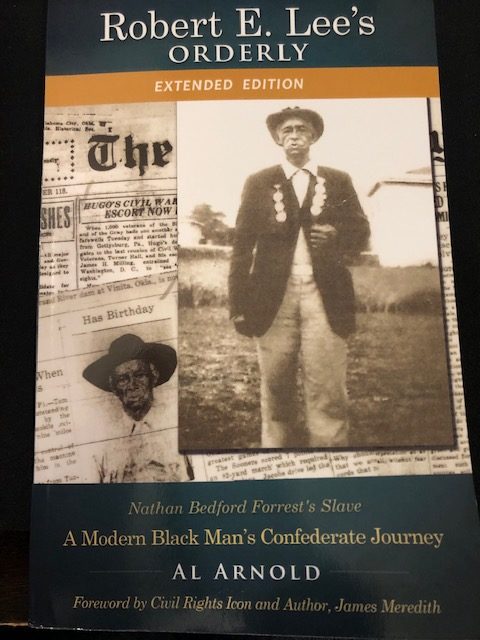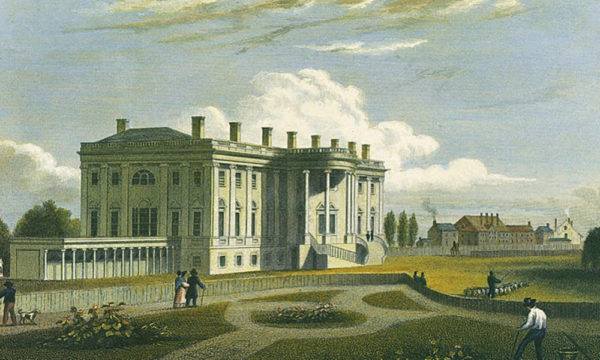A review of Robert E. Lee’s Orderly, A Modern Black Man’s Confederate Journey by Al Arnold (Newson Publishing, 2015)
I think it is safe to say that there isn’t a man alive who loves the South, particularly Mississippi, more than Al Arnold. Over the Christmas season, I had the pleasure of making his acquaintance through a live Facebook interview conducted by Vinny Balducci at Monuments Across Dixie. Al was discussing the destruction of Confederate monuments and the books he has written about his own Confederate history. I decided to purchase the first book, Robert E. Lee’s Orderly: A Modern Black Man’s Confederate Journey and just days later I received my signed copy. I read the book and thoroughly enjoyed it, but the way it was signed, “Connected at the Cross in Love!” signifies the greatest takeaway, as you will see by the conclusion of this review.
Robert E. Lee’s Orderly weaves together Al Arnold’s personal experiences growing up in Verona, Mississippi with his discovery of his connection to his Confederate ancestor, Turner Hall Jr. Al’s reflections on life in Mississippi do not fit the narrative with which Americans are being inculcated in order to stir up racial strife. His memories are of a strong Christian community of blacks and whites living with a degree of separation that people today cannot accept, but which was natural to cultural differences and devoid of animosity. He praises his teachers, black and white, who loved and disciplined him with a patience and kindness that he credits for much of his success in life. He remembers fondly his friends, black and white, who though they had separate proms or places to hang out, visited each other freely with no feelings of exclusion. Al claims it was a time when race didn’t matter.
Mr. Arnold also relates stories of his incredible family who endowed him with values of hard work, faith, love, and forgiveness. It is this family, proud of their heritage, which shared the stories of Turner Hall Jr. that led to Al’s fascinating discoveries. Through exposure to family photos, newspaper articles, and other research, Al was able to confirm that his great-great-great grandfather Turner Hall Jr. was a slave who was owned by General Nathan Bedford Forrest and later served as an orderly for General Robert E. Lee. You can imagine the conflicting feelings Al must have had making this discovery, but what he has done with this truth is admirable. He came to revere his ancestor for his faithful service and standing in his community and to echo the respect this ancestor had for the men he served.
Many of us have done family history only to discover stories that we have a difficult time accepting. I personally found a prison record for a lost great-grandfather that I spent months trying to disprove only to find indelible proof of its accuracy instead. These experiences give us an opportunity to ponder what life and history is really all about and this is where Al and I came to the same conclusion. History is a story of redemption, for all of us. Al says it best when he reminds us that history is His (God’s) story, not ours. [i] It takes many twists and turns, but it is all about people needing a Savior and God doing His work in His own mysterious way. This is the only lens by which we can profitably study history, learning from the errors of others and humbly recognizing our own fallibility. It allows us to extend Grace to imperfect people in the past and reconcile differences we see in people around us today. There are those who wish to see resentment, hate, envy, and violence prevail, who mock anyone who advocates forgiveness and reconciliation, but they will never know peace. Al correctly advocates for the kind of Love that overcomes all difficulties.
Although the organization of Robert E. Lee’s Orderly makes it somewhat difficult to read, it is full of insights about the value of monuments, the Confederate flag, modern race issues, black confederates, and many other topics worth considering. I enjoyed reading a perspective that I suspect other black southerners have, but that is not popular with those who control the current flow of information. It was a refreshing Christmas gift for me to read a history that unabashedly acknowledges God at the center of it all.
[i] Arnold, Al. Robert E. Lee’s Orderly, A Modern Black Man’s Confederate Journey. Newson Publishing, New York, 47.







General Forrest had a personal bodyguard of 50 to 100 men. Of these, 8 were black and his former slaves. General Forrest had 44 of his slaves follow him throughout the war…only one was not with him at the very end. When his bodyguard and staff met after his death for reunions, the colorbearer was one of his former slaves.
The first casualty of war is truth.
The Kennedy Twins, like Al, are from Mississippi and have a love for the Southland. We had the pleasure of meeting Al many years ago and never miss a chance of being with him. After speaking to a Confederate Heroes luncheon recently, we had the honor of visiting with Al, who was a featured speaker at a Lee-Jackson Banquet that afternoon. I recommend Al’s books to anyone who loves “the rest of the story.” Do Vindice. Walter D. (Donnie) Kennedy